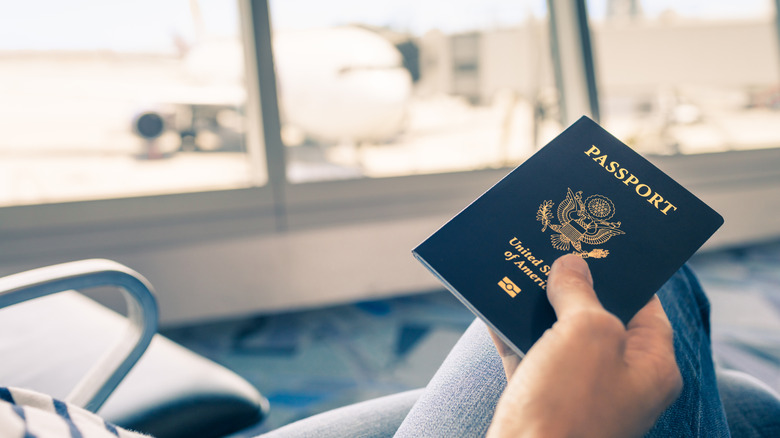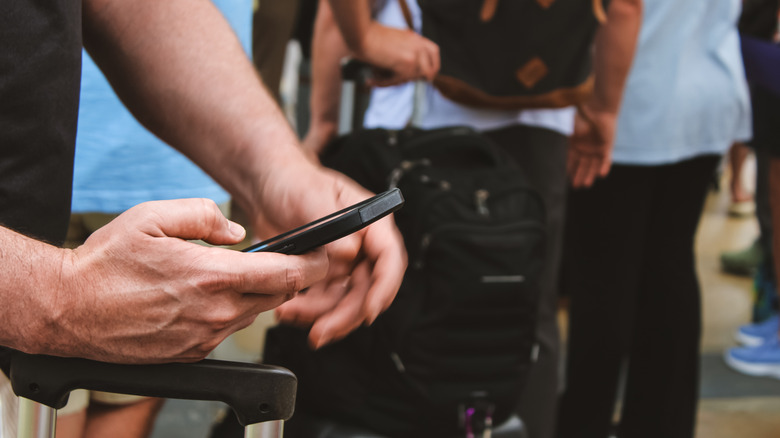Rick Steves Recommends This Important Tip Before Leaving For Your Vacation
Imagine this scenario on a trip: You're in the European city of your dreams, entranced by sights and sounds you've only seen on TV. Then, when you get to a location that requires you to have your ID, you suddenly realize that your passport has been taken out of your bag while you were enjoying the view. It's a scary scenario, but it's not out of the realm of possibility. Then there is the situation where you're picking up your rental car, only to find that they can't locate your reservation, and your phone won't connect to the internet to find it online. However, if you listen to some advice from travel pro Rick Steves, there is a way to keep this from becoming a complete disaster. On his website, Steves tells us that backing up your documents can give you peace of mind, and allow you to deal with these issues much more quickly.
He explains, "Before your trip, scan, make photocopies, and/or take photos of your documents (front and back). I like to both pack along a hard copy and have a digital version available on my phone (or uploaded to an easily accessible location in the cloud, such as Dropbox)." Steves also recommends leaving copies of your documents with a trusted friend or family member at home, so they can send the information if needed. There are a number of ways to do this, and it can make things so much easier if, for instance, you lose or damage your passport and need to get it replaced.
The travel documents you should make copies of, as per Rick Steves
Travel documents Steves says you should have copies of include your passport (which should have at least six months left after your return date before it expires), your passport card if you're driving or sailing to and from Canada, Mexico, Bermuda, or the Caribbean, your driver's license, and your visa and/or travel authorization if the country you're traveling to requires it. That part may seem obvious. However, these aren't the only documents you may need to backup.
Steves also recommends backing up your travel insurance information if you have it, your vaccination status if needed, rental car information, your International Driving Permit if you need one (which you can get through AAA), hotel reservations, ticket info for museums and the like if you've pre-booked, and any other information you may have to show to someone. You might also want to do this for your student ID if you have one for student discounts. For example, many places in Europe, he tells us, give discounts for students if they're under 26. On the other hand, he says that you shouldn't make copies of your credit or debit cards, but says we should "keep the number in a retrievable place." He also suggests bringing a few extra passport-style photos in case you have to replace it at the U.S. embassy or consulate. However, there are a number of ways you can back all of this up, and there are good reasons to use more than one.
How to back up your travel documents before you leave for your trip
Steves mentions backup techniques that include printing document copies. Though lots of us no longer have printers, you can copy them at many libraries or at copy centers. However, having a digital backup as well can save you time. You can scan or take pictures of your documents (front and back, as he says), reservations, etc. on your phone or tablet, but if your phone gets lost, someone else may be able to access them. Your best bet is to put these digital copies in a password-protected folder that you email to yourself. That way, even if you lose your device, you can use another computer to find them.
That is true for things like travel documents, ID, and other things that could be used to steal your money or identity. However, for documents like car reservations, museum tickets, and even your boarding pass, you should also take screenshots and keep them in a specific album on your device in addition to the password-protected folder. That way you can access them quickly if your phone doesn't connect when you land. You can lock the album (Android) or hide it (iOS) so you're the only one who can get to it. While this is on your mind, it's also important to take another piece of travel advice that Steves gives often, which is to travel with a money belt. This is a zippered pouch that you wear under your clothing where you can store money, IDs, cards, a phone, and even your passport so it's not as vulnerable to pickpockets.


